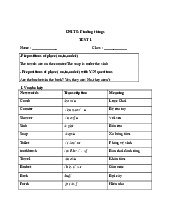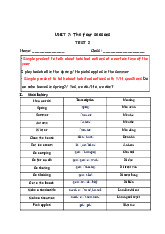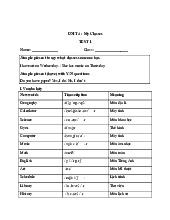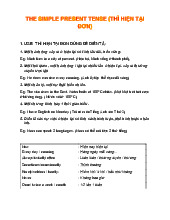






Preview text:
I. Match each word / phrase with the definition and write the answer in each blank. 1. alien (n)
A. a large body in space that moves around the sun 2. spaceship (n)
B. Unidentified Flying Object 3. solar system (n)
C. having no weight, especially when travelling in space 4. galaxy (n)
D. a creature that comes from another planet 5. UFO
E. a large group of stars and planets in outer space 6. planet (n)
F. a vehicle in which people can travel in space 7. orbit (n)
G. a person who travels in a spaceship 8. satellite (n)
H. the sun and the planets that move around it 9. astronaut (n)
I. a man-made object that has been sent into space and that moves around a planet 10. weightless (adj)
J. the path taken by something (a planet, a satellite, etc.) going round something else in space
Il. Complete the sentences with the words given. gravity trace creatures craters rocket probability commander telescope aliens satellite Galaxy spaceships 1. He believes that visit the Earth in UFOs. 2. What is the of winning? 3. Mars'
is only about 38% of the Earth's.
4. We try to fly to distant planets in futuristic
5. The troops will go into action as soon as their gives the order. 6. The film was about from the outer space. 7. There is no of the camp left.
8. Jupiter is the biggest planet in our solar system, but not the biggest planet in the 9. They launched a to the planet Venus. 10. The moon is a natural of the Earth. 11. With a good you can see on the moon.
Ill. Complete the sentences with the adjectives given. special imaginary actual promising gravitational living suitable unsuitable habitable intelligent 1. Water is essential to things.
2. Some areas of the country are just too cold to be
3. The equator is a(n) line around the middle of the Earth. 4. These roads are
for use by heavy vehicles, so they can't enter these roads.
5. A conference was planned, but finding a(n) location was difficult. 6. Firefighters use
breathing equipment in smoky buildings. 7. They are searching for
life forms in other solar systems.
8. Her school report described her as a very student.
9. The story of the film is based on events and people. 10.
A black hole is matter so dense that nothing, not even light, can escape its pull.
IV. Complete the sentences with the correct form of the verbs given. travel destroy take over attack land hold repair break down oppose support
1. She as manager two weeks ago.
2. You can a plane on water in an emergency.
3. Their car and they had to push it off the road. 4. The elderly free on public transport.
5. Most of the local residents
to the closing of the school last month. 6. She asked if he could the broken lamp.
7. His starting salary as a new teacher wasn't enough to a family.
8. She used to love cats, but one cat her and she doesn't like them anymore.
9. In 1906, an earthquake much of San Francisco.
10. Can youthe bag while I open the door? l. Choose the correct words.
I met a man in the city centre who asked me ...
1. whether I knew / know where Ben Thanh Market was.
2. if I have / had been there before.
3. what did I think / I thought of the city.
4. where did I come / I came from.
5. how much money I have got / had.
6. whether I want / wanted to buy a souvenir.
Il. Read the questions. Choose the correct reported questions.
1. 'Where did you go on holiday?'
A. He asked us where we did go on holiday.
B. He asked us where we went on holiday.
2. 'Do you know about the Snowman?'
A. He asked me if I knew about the Snowman.
B. He asked me if I know about the Snowman. 3. 'Will you set off early?'
A. She asked me would I set off early.
B. She asked me if I would set off early.
4. 'Do you want a new laptop?'
A. My dad asked me did I want a new laptop.
B. My dad asked me if I wanted a new laptop.
5. 'Can I borrow your calculator?'
A. Mai asked if she can borrow my calculator.
B. Mai asked if she could borrow my calculator.
6. 'Where is the public library?'
A. They asked where the public library was.
B. They asked where was the public library.
7. 'What can I do in the club?'
A. Nick asked me what he could do in the club.
B. Nick asked me what can he do in the club.
Ill. Write reported questions.
1. 'When do you clean your shoes?' She asked him 2. 'Where do you often go swimming?' c She asked me
3. 'What are you listening to?' c We asked him
4. 'What will you do with the prize money?' They asked us 5. 'When will you get a new bicycle?' c He asked me
6. 'What sports do you play?' c The doctor asked him
7. 'Why are you in a hurry?' c I asked my father
8. 'Where did you park your car?' c I asked her
IV. Change each of the questions into reported speech. Begin each one with the words given.
1. 'Where is the principal's office?' I didn't know 2. 'Where does Mr. Smith go?' We wanted to know
3. 'Which file is the letter in?' The teacher asked me
4. 'When is he leaving for the foreign trip?' No one seemed to know
5. 'When will your father get back?' He asked me
6. 'Where do you put the book?' I asked him
7. 'What time are you coming back?' He didn't tell me
8. 'Where is it?' c I didn't have any idea 9. 'What does this word mean? c I asked him
10. 'How well does she speak English?' We wanted to know
V. Write the following sentences as reported questions, using the word given in brackets.
1. 'What's your name?' he asked. (wanted to know)
2. 'How old are you?' she said. (asked)
3. 'Who will you see at the meeting?' my mother said. (asked)
4. 'When does the train leave?' I asked. (wanted to know)
5. 'How do you get to school?' she said. (asked)
6. 'Why can't you come to the party?' she asked. (asked)
7. 'Where do you live?' the boy asked. (wanted to know)
8. 'Who do you want to talk to at the meeting?' she said. (asked)
9. 'Why are you so late?' the teacher said. (demanded to know)
VI. Write these questions into reported speech, using wanted to know and the words given in brackets.
Example: 'Which book will you take?' (he)
He wanted to know which book I would take. 1. 'What are you doing?' (he)
2. 'How far do I have to walk?' (she)
3. 'What do you have to eat for lunch?' (he)
4. 'What time does the performance start?' (he)
5. 'How long does the journey take?' (she)
6. 'Where do you stay in Ho Chi Minh City?' (my aunt)
7. 'When do you start your Japanese class?' (my mother)
8. 'Where do you like to spend your holiday this year?' (she)
9. 'What nationality is Jack?' (we)
10. 'What are you wearing for the party tonight?' (my sister)
VII. Complete the direct questions.
1. Can you tell me how old you are? How
2. Can you tell me how you made this cake? HOW
3. I'd like to know when you arrived. 'When
4. I'd like to know when she'll be ready. 'When
5. Can you tell me what you're doing? 'What




![[ TỔNG HỢP ] TEST TIẾNG ANH NGỮ PHÁP IN ON AT | Trường Đại học Hải Phòng](https://docx.com.vn/storage/uploads/images/documents/banner/e7c7a503440e4733c5f4a511b73d9e8c.jpg)